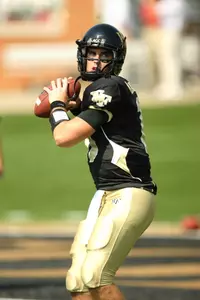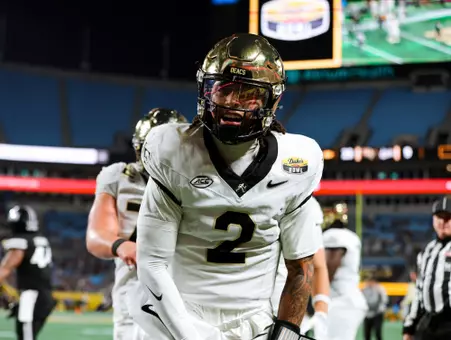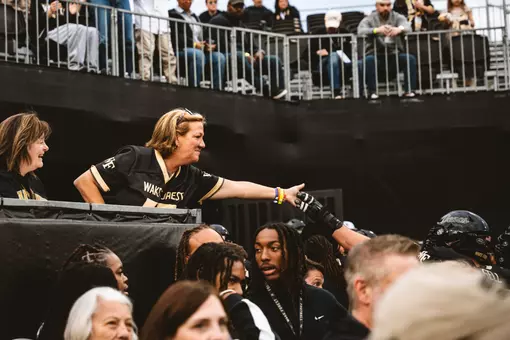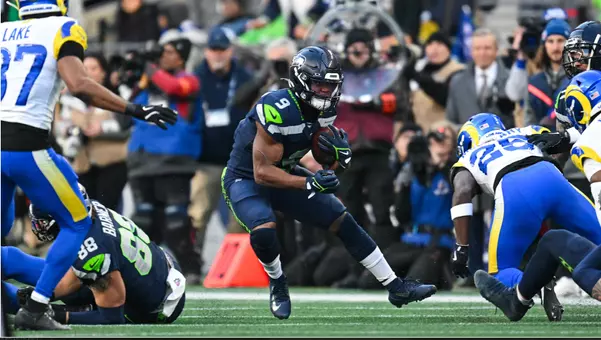Wake Forest Athletics

Anderson Continues Strong Receiver Tradition
10/14/2003 12:00:00 AM | Football
Oct. 14, 2003
As players and coaches shook hands following Virginia's come-from-behind 27-24 victory over Wake Forest, Coach Al Groh of Virginia walked up to receiver Jason Anderson, told him he was a great player and that he wished he played on his team. "We've never really talked before, but when the ref said the game was over I just stopped and hung my head," Anderson said. "Here he comes with his security guard walking toward me. No coach has ever told me I wish I had you on my team. I was honored to hear something like that because he's a great coach. That's a pretty amazing to hear something like that."
The complement slightly sweetened the bitter taste left in Anderson's mouth after a game of missed opportunities that left the Deacons 3-2 overall. And while he greatly appreciated Groh's words, they kind of surprised the junior. Although he has the statistics, the skills and the reputation as one of the ACC's top receivers, Anderson views himself as a work in progress. He doesn't believe the hype.
"I feel like I'm living a dream," Anderson said. "I'm serious, I feel like I'm just getting lucky. I'm just at the right place at the right time. I don't really read too much in the paper, I haven't seen myself on a Sports Center highlight. I just think I'm an average football player. It's just like Coach (Jim) Grobe says, it's his signature saying, 'Just when you think you're ripe, you're really almost rotten.' That's kind of been my thing."
Wake Forest has a long tradition of good wide receivers, and the mantle was passed on to Anderson this season. As a sophomore, he emerged with a solid season (23 catches, 535 yards, 6 touchdowns) and after three receptions for 157 yards and two touchdowns in Wake Forest's 38-17 Seattle Bowl victory, he was anointed, by the media, as Wake Forest's next great receiver. Although not a starter in 2002, he entered the 2003 season averaging 23.3 yards per catch, a mark that ranked second nationally. Entering the 2003 Georgia Tech game, he leads the team with 21 receptions, 364 yards and has three touchdowns.
His attributes are what many college coaches consider to be prototypical for a wide receiver. His 6-3 frame combined with long arms, sure hands, an ability to jump and sub-4.5 speed in the 40-yard dash give him the tools to be a good player.
"Ever since we've been here, we've known Jason Anderson would be a special kid for us," wide receivers coach Kevin Sherman said. "He's one of our favorite targets, and I would hate to think what it would be like without him. He's a pleasure to coach, and when I'm not in the (meeting) room, he's kind of a coach because I've said those same things to him so many times that he knows what I'm going to say.
"He's still got a lot of work to do, but he's getting better because he's been consistent each week. He has to be because teams know when we have to throw Jason is our target. He's got to work at it every week. I threaten him all the time, telling him we can still go back to three backs and two tight ends."
With Anderson on pace to become one of the ACC's best receivers, Wake Forest probably won't be deferring to a two tight-end set any time soon. He is currently averaging 19.04 yards per reception, a figure that, if Anderson's collegiate career were complete today, would rank fifth in the league's all-time statistics for yards per catch. He would rank second to Todd Dixon by Wake Forest career standards for yards per catch. Just five games into the 2003 season, Anderson has 72 career receptions for 1,371 yards. He already ranks among the top 10 in Wake Forest career receiving yards and is tied for 10th in career receiving touchdowns. So with seven games left in 2003 and his senior season yet to be played, it's obvious why Anderson has been labeled as Wake's go-to receiver and deep threat.
The irony of Anderson's story is that Wake Forest fans indirectly have former North Carolina Coach Dean Smith and his basketball program to thank for what he is doing for the Demon Deacons on the gridiron.
"I grew up a die-hard Carolina basketball fan," Anderson said. "Everything I had was Carolina basketball. I probably shouldn't be saying that now, but my brother (Jonathan Anderson) went to Carolina. So when I was 7 or 8 years old, he was going to college, and that's when that started. Playing basketball in college at Carolina was my ultimate dream, but I really just wanted to play basketball in college."
In Anderson's mind, basketball was his future. Growing up he honed his basketball skills playing on recreation league and AAU teams in Hampton, Va., where he was living with his mother. Football was never a serious consideration as far as Anderson was concerned. Even if it had been his uncle, Cornelius Johnson, was advising his parents not to allow him to play until he was older. Johnson played professional football for the Colts and Broncos of the NFL. As a result, Anderson never played organized football until the age of 14.
"It was smart," Anderson said of his uncle's advice. "But I think, where would I be today if I had been playing as long as most people have been playing. It's something I'll never know. All I can do is just look back on it and wonder. But I'm not complaining. I still love basketball. Mom (Helen Johnson-Anderson) taught me how to play. She was there the whole time, chauffeuring me around to basketball games. After games she would tell me I needed to do this or that. She taught me how to take a charge, said I needed to get in front of them, throw my body out, give a little yell and do a little acting job. She taught me some stuff I needed to know, and I listened to her.
"During the summer, when I'd visit my dad in Charlotte, I'd play basketball every day. I'd get up about 10 or 11 o'clock, eat breakfast, walk to the (Simmons) YMCA and start shooting around. Wendy's was just down the street, so I'd walk down there and get something to eat, go back and play basketball until 8 or 9 that night with the big boys. My dad would come pick me up, and then I'd do the same thing the next day."
Also feeding Anderson's basketball ambitions was something his junior varsity coach, Stacy Palmore, had told him. Palmore played college basketball at the University of Richmond and was one of Anderson's coaches when he was chosen to play on a junior varsity high school team as an eighth-grader. Looking at his athletic ability, Palmore told Anderson that he would one day play college basketball.
"I took that, and worked hard, and basketball was my thing," Anderson said. "I played power forward. But when I moved back to Charlotte with my dad (Barry Shuford, football coach at Butler High School) asked me how many 6-3 or 6-4 power forwards did I see playing college basketball. That shot my basketball hopes. So I stuck with football.
"I had to kind of step back and look at the reality of it. Power forwards are all 6-8 to 6-10 in college, and then I looked at receivers and saw most DBs are 5-8 to 5-10. I was 6-2. I had a height advantage there where in basketball I had a height disadvantage. So I went with football and decided to see where it takes me."
At Charlotte's Butler High School, football took him to the top of many college recruiting lists. Anderson caught 55 passes for 954 yards as a high school senior and was a 1999 Shrine Bowl and all-state selection. By the time he graduated from Butler Anderson had amassed 112 receptions, 2,282 yards and 28 touchdowns.
"They just threw me long balls all day and told me to run streaks, Anderson said of his high school days. "I kind of used my basketball skills, tried to transfer it to the football field by jumping and boxing out. Like I'm going for a rebound is how I tried to catch balls." Anderson is still using his basketball skills on the football field. The same skills he hoped would one day attract the attention of Dean Smith are now being used to catch highly thrown passes and fades designed to take advantage of his lean 6-3 frame and jumping ability. But no matter how many receptions he hauls in, how many yards receiving he amasses, or how many touchdowns he scores, Anderson refuses to believe he is little more than average.
"He's not a guy who has an ego, but a guy who has his feet on the ground because he understands that it's a team game," Sherman said. "He's a big part of the system, but he knows he can't do it all by himself. He's not bigger than the team, and that comes from Coach (Jim) Grobe. He talks to our guys all the time about giving credit where credit is due."
As a freshman, Anderson caught five passes for 150 yards and hauled in the game- winning 64-yard touchdown catch to help Wake Forest defeat Virginia. Anderson said after he caught the ball, he ran "like he stole something." The play was a foreshadowing of things to come, but it was also a marker in his career. In fact, reflecting on some of his best performances have led Anderson to believe there is much more to be accomplished.
"After the Virginia game two years ago, I had had a great game, a 100 yards, my best game ever. The next Monday at practice I dropped like four balls. I said to myself I can't do that. The Seattle Bowl, there was no way I could be that open. It had to be luck. Coach Sherman told me before the Seattle Bowl that I was going to have the biggest game of my life. I said I'd do what I have to do. But I just can't visually see myself as a good player. The day I think I'm a good player is the day I need to retire, stop playing football. Somebody's always out there outworking you."
His own standards seem to far exceed what anyone would ask of him as a player, but it seems to give this self-proclaimed mama's boy the edge most top athletes seem to possess. Although he grew up loving basketball, Anderson sees that football is where his talents can be best showcased. It's something he does not want to take for granted.
"In football I just don't feel I'm where I need to be. I'm starting to realize I have a chance to do something good, and I don't want to take advantage of that. I want to make the most of every opportunity. I don't want to look back 20 years down the road and say I should have done this or that my junior or senior years and could have been playing pro."
With a complete commitment to making the most of his college football career, Anderson gained 10 pounds of muscle over the summer working out with weights, eating protein bars and a healthy diet. He is still in the process of assembling his own off-season workout and diet regimen, but his ideas resemble ones Jerry Rice, arguably the best receiver to ever play football, uses to maintain his edge. Anderson said after the season is over he may write Rice, a player he has long admired, to ask about workouts, philosophy, and what it takes to play in the NFL. He said it's probably more of an experiment to see if he gets a response.
Anderson already has plans to work on his agility and speed, and he wants to find a personal trainer to help him implement and manage a rigorous training regimen. He also wants to practice one-on-one against a formidable cornerback. Those are Anderson's plans for the future. At the present, he has to stay focused on working on his degree in history, the season and following the game plans Grobe and his staff have assembled. The results, so far have been positive, and although he doesn't yet believe what's happened he wants the way things are going to remain just the same. "Like I said, I'm living a dream, so there's no sense in coming back to reality," Anderson said. "I'm having too much fun."



